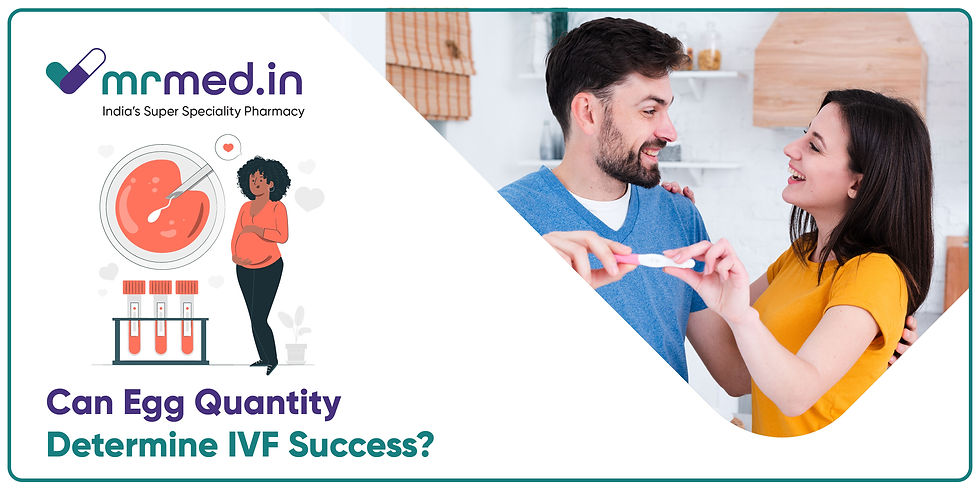How Egg Quantity Impacts IVF Success Rates: A Guide for Couples
- Healthcare Tips

- Nov 13, 2024
- 3 min read

When it comes to IVF, so many questions pop up, and one of the big ones is about egg quantity. It’s natural to think, “More eggs, better chances, right?” but the answer isn’t that straightforward. IVF is a journey, not just about numbers but about understanding what those numbers mean for your success rate. This guide is here to break down why egg quantity matters and why it isn’t the only factor. Let’s dive into what really impacts IVF outcomes, from quantity and quality to lifestyle choices you can make along the way.
How does egg quantity impact IVF success?
Here’s the thing—having more eggs retrieved during an IVF cycle gives doctors more embryos to work with, which generally boosts your chances. Why? Because it means more options to find those high-quality embryos that have the best shot at sticking around for the long term. But let’s keep it real: quantity alone isn’t the winning ticket. The quality of each egg plays just as big a role. So, while more eggs are helpful, it’s the quality within that batch that makes a difference.
In cases where ovarian reserve is low, treatments like Foligraf 900IU PEN Injection (Follitropin Beta) can stimulate the ovaries to help increase the number of eggs. Think of it as giving your body a little boost, especially when numbers are looking low. But always remember—more eggs mean more options, not automatic success.
What factors determine egg quantity in IVF?
Your egg count isn’t just a random number—it’s shaped by a mix of age, genetics, lifestyle, and even a bit of luck. Age is a biggie. Generally, women under 35 have a better reserve, but it’s not a guarantee. Family history can also play a role, and some women naturally have a lower count, even if they’re young and healthy.
Fertility medicines are designed to maximise egg production during an IVF cycle. These meds stimulate the ovaries, encouraging them to produce more eggs than they typically would in a natural cycle. It’s all about creating more opportunities.
Is egg quality more important than quantity for IVF?
Yes, absolutely. If there’s one thing to focus on, it’s this: a single high-quality egg can sometimes be worth more than several low-quality ones. Quality eggs have a better chance of fertilising and growing into a healthy embryo, which is ultimately what counts. Just because you’ve got a high number doesn’t mean each one will make it to the finish line.
Using treatments like Recagon 300IU helps create a balance, enhancing both quantity and quality. Doctors aim to get as many quality eggs as possible because, with each healthy egg, your chances of success go up.
How does reproductive awareness influence IVF success?
Reproductive awareness is more than just a buzzword; it’s a powerful tool. When couples understand their fertility factors, they’re better equipped to handle the ups and downs of IVF. Being aware of how age, health, and lifestyle impact fertility allows couples to make proactive decisions.
Engaging with Women’s Health resources, learning about IVF Treatment & Medicines, and exploring aspects of Sexual Wellness can make all the difference. When you know the what and why of each step, IVF feels less intimidating and more within reach.
What lifestyle changes can improve egg quantity and quality?
You might be surprised, but lifestyle changes can actually support egg health. Here’s what you can do:
Nutrition: Eat foods rich in antioxidants (think berries leafy greens) to fight oxidative stress.
Stress Reduction: Chronic stress messes with hormones. Techniques like meditation and yoga can help maintain balance.
Avoid Toxins: Cut down on smoking and alcohol—they can have a direct impact on ovarian reserve.
Stay Active: Regular exercise supports hormonal health, which, in turn, impacts egg quality.
Discussing Sexual Wellness and overall health with a fertility expert can help ensure you’re in the best possible shape for IVF.
How should couples emotionally prepare for IVF?
IVF isn’t just a medical process; it’s an emotional one. Couples should prepare by setting realistic expectations, supporting each other, and, if needed, seeking guidance from counsellors or support groups. IVF can put a strain on relationships, so keep the lines of communication open.
Having a strong support system—whether it’s family, friends, or a counsellor—can make the journey smoother. Remember, you’re not alone, and there’s a network out there for couples going through the same process.
Comments